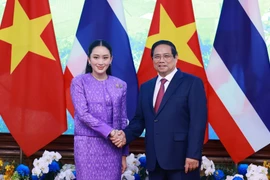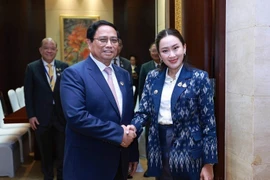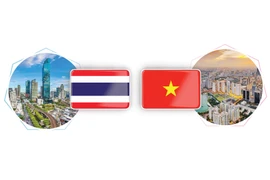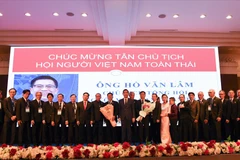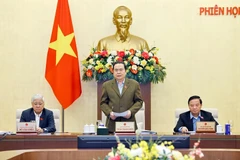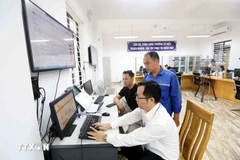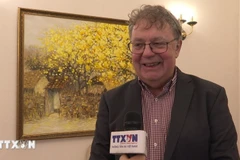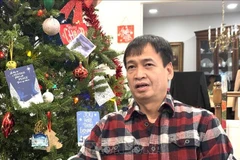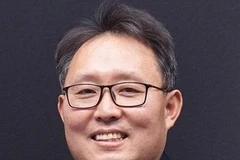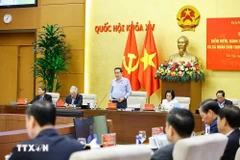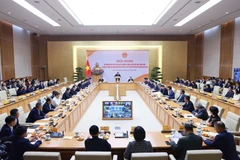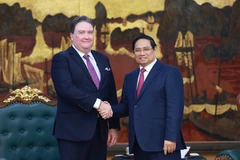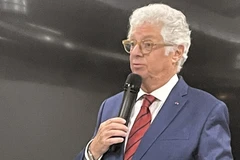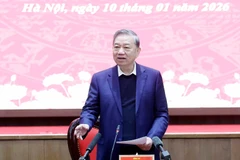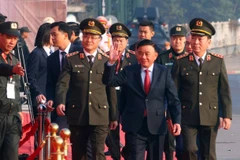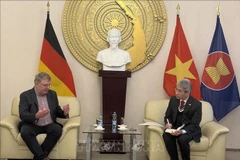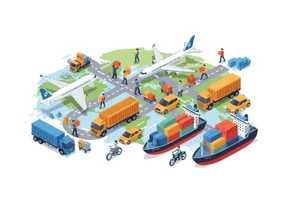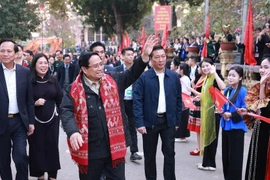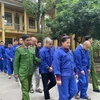Hanoi (VNA) – Vietnam and Thailand have officially upgraded their relations to a comprehensive strategic partnership, heard a press conference co-chaired by Prime Minister Pham Minh Chinh and his Thai counterpart Paetongtarn Shinawatra in Hanoi on May 16.
PM Chinh told the press following the 4th Vietnam-Thailand Joint Cabinet Retreat the same day that the meeting took place successfully, stressing the two sides reached consensus on many key strategic orientations.
He noted that Thailand was one of the first ASEAN countries to establish diplomatic ties with Vietnam after Vietnam's national reunification. It is also the only nation with which Vietnam has established a joint cabinet meeting mechanism, initiated by Thai PM Thaksin Shinawatra in 2004.
Thailand was also the first ASEAN country to set up a strategic partnership with Vietnam in 2013, the leader continued.
The establishment of the comprehensive strategic partnership helps foster a peaceful and stable environment in terms of security and defence across ASEAN, Asia, and the world at large, the PM emphasised.
It also contributes to fast and sustainable socio-economic development in both Vietnam and Thailand, bringing greater prosperity and well-being to their people, he said.
The two sides agreed to promptly develop an action programme to implement the comprehensive strategic partnership for 2025–2030, built on three key pillars.
Under the first pillar - partnership for sustainable peace - they consented to deepen political, defence, and security cooperation to help maintain a peaceful, secure, and stable environment in both countries and across the region.
Accordingly, they will enhance high-level exchanges, firstly preparations for a visit to Vietnam by the King and Queen of Thailand and a visit to Thailand by Party General Secretary To Lam at an appropriate time.
At the same time, the two countries will strengthen bilateral cooperation mechanisms, particularly the Joint Cabinet Retreat and the Joint Commission on Bilateral Cooperation. Notably, they will hold annual meetings between the two Prime Ministers in both bilateral and multilateral settings, and explore upgrading the defence policy dialogue and the high-level dialogue on crime prevention, suppression and security issues to the ministerial level.
They concurred to promote and expand cooperation in maritime security and safety, defence industry, logistics, military medicine, search and rescue, border management, and exchanges between military services and branches.
Both sides committed to enhancing joint efforts in combating transnational crimes, particularly drug trafficking, human trafficking, and cybercrime. They pledged not to allow any individual or organisation to use their territory to undermine the other.

The sides agreed to step up coordination and exchanges on regional and international issues of mutual concern, emphasising the importance of maintaining ASEAN’s solidarity, resilience, and unity in diversity, while upholding its centrality.
They also shared the view on the significance of preserving peace, stability, security, safety, and freedom of navigation in the East Sea, in accordance with international law, particularly the 1982 United Nations Convention on the Law of the Sea (UNCLOS). Both sides also pledged to push for the early adoption of an effective and substantive Code of Conduct (COC) consistent with international law.
For the second pillar—partnership for sustainable development—the two sides agreed to strengthen economic connectivity through the “Three-Connections Strategy,” which focuses on linking supply chains, businesses and localities, and sustainable and green growth strategies between the two countries.
Building on that foundation, the two sides will further facilitate each other’s import and export activities, aiming to raise bilateral trade to 25 billion USD in a balanced and sustainable manner.
They will also create more favourable conditions for businesses to access each other’s markets and expand investment, particularly in high-potential sectors such as clean energy, digital economy, green economy, innovation, and high-tech agriculture.
In addition, the sides will reinforce connectivity in transport infrastructure and logistics, particularly along the East–West Economic Corridor, to facilitate the movement of goods, services, and people between the two countries and across the region.
They will enhance cooperation in science and technology, innovation, and digital and green transformation across sectors, toward a low-carbon, net-zero economy.
Labour, employment, and social welfare cooperation will also be expanded, with both sides pushing forward the implementation of the agreement on recruiting Vietnamese workers to Thailand.
Under the third key pillar – Partnership for a Sustainable Future, both sides identified that investing in youth, education, and people-to-people and cultural exchanges means investing in a closely connected and sustainable future for the two nations and their peoples.
In this spirit, they agreed to further promote people-to-people exchanges, especially among the younger generations, strengthen cooperation between educational institutions, increase student exchange and scholarship programmes; expand Vietnamese language centres in Thailand and vice versa; make the most of local-level twinning frameworks; and encourage the opening of more direct flight routes between localities of the two countries. They also pledged to advance the realisation of the “Six Countries – One Destination” tourism connectivity initiative.
The two sides pledged to create favourable conditions for each other's citizens to live, work, and study in the other country.
PM Chinh affirmed that with this upgrade, Vietnam – Thailand relations have become a “powerful current in the broader river of regional cooperation”. He expressed his confidence that, building on the friendship, shared vision, and strategic trust, the relationship will continue to flourish and spread positive values — not only for the two peoples, but also for peace, stability, cooperation, and sustainable development in Southeast Asia.
Thai PM Paetongtarn expressed her delight at the two countries’ agreement to upgrade their ties to a Comprehensive Strategic Partnership, a move that reflects the importance both sides attach to each other and opens a new era in bilateral relations, especially in a world of complex and unpredictable developments.
Agreeing with the points shared by her Vietnamese counterpart, Paetongtarn stated that both sides have agreed to step up high-level visits and political consultations. As an immediate step, she invited the Vietnamese Government leader to attend the Mekong – Lancang Cooperation Summit, scheduled to be held in Thailand by the end of 2025, as well as activities commemorating the 50th anniversary of Vietnam – Thailand relations in 2026.
The two sides agreed to strengthen cooperation in security and defence, particularly in combating drug trafficking, online fraud, and illegal, unreported, and unregulated (IUU) fishing. They also agreed to share intelligence information to counter transnational crimes and to enhance economic connectivity to make use of each side’s strengths and complement one another based on the three pillars of supply chains, local economy, and the green economy, with the goal of raising bilateral trade to 25 billion USD in the near future.
According to the Thai PM, the two sides also agreed to soon convene a meeting of the Vietnam – Thailand Joint Trade Committee; facilitate their enterprises' cooperation, investment, business cooperation activities; and further promote transport connectivity by air, land, and sea, including the opening of direct air routed from Vietnam to Northeast Thailand. They also concurred in further boosting tourism between the two countries, particularly between Vietnam and Northeast Thailand, as well as along the Singapore – Vietnam – Thailand sea cruise route.
The two countries were also unanimous in fostering cooperation in education, training, and human resources development, especially in the fields of STEM, artificial intelligence, and semiconductor. They agreed to expand successful models such as the collaboration between Khon Kaen University and FPT University in training semiconductor engineers.
Importantly, they also reached consensus on promoting cooperation in the Mekong subregion and within ASEAN, and to support ASEAN’s centrality in fostering peace in Myanmar.
Earlier, the two Government leaders witnessed the exchange of eight cooperation documents across various fields between ministries, sectors, and localities of the two countries./.

